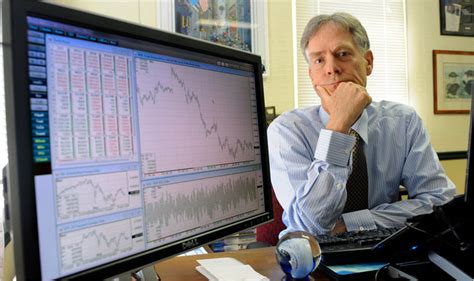Top 424 Investor Quotes & Sayings - Page 7
Explore popular Investor quotes.
Last updated on November 7, 2024.
The United States has given frequent and enthusiastic support to the overthrow of democracy in favor of "investor friendly" regimes. The World Bank, IMF, and private banks have consistently lavished huge sums on terror regimes, following their displacement of democratic governments, and a number of quantitative studies have shown a systematic positive relationship between U.S. and IMF / World Bank aid to countries and their violations of human rights.
In our view, though, investment students need only two well-taught courses-How to Value a Business, and How to Think about Market Prices. Your goal as an investor should simply be to purchase, at a rational price, a part interest in an easily-understandable business who's earnings are virtually certain to be materially higher five, ten and twenty years from now.
In questioning initially whether I am a great investor, I open the door to question whether other similarly esteemed public icons like Bill Miller are as well. It seems, perhaps, that the longer and longer you keep at it in this business the more and more time you have to expose your Achilles heel - wherever and whatever that might be.
Investors, of course, can, by their own behavior make stock ownership highly risky. And many do. Active trading, attempts to "time" market movements, inadequate diversification, the payment of high and unnecessary fees to managers and advisors, and the use of borrowed money can destroy the decent returns that a life-long owner of equities would otherwise enjoy. Indeed, borrowed money has no place in the investor's tool kit.
When I stand on my special-issue "Intelligent Investor" ladder and peer out over the frenzied crowd, I see very few others doing the same. Many stocks remain overvalued, and speculative excess - both on the upside and on the downside - is embedded in the frenzy around stocks of all stripes. And yes, I am talking about March 2001, not March 2000.
In the 40 years I've been working as an economist and investor, I have never seen such a disconnect between the asset market and the economic reality... Asset markets are in the sky, and the economy of the ordinary people is in the dumps, where their real incomes adjusted for inflation are going down and asset markets are going up.
There are no bad business and investment opportunities, but there are bad entrepreneurs and investors. To be a successful business owner and investor, you have to be emotionally neutral to winning and losing. Winning and losing are just part of the game. The size of your success is measured by the strength of your desire, the size of your dream and how you handle disappointment along the way.
The moment a large investor doesn't believe a government will pay back its debt when it says it will, a crisis of confidence could develop. Investors have scant patience for the years of good governance - politically fraught fiscal restructuring, austerity and debt rescheduling - it takes to defuse a sovereign-debt crisis.
NAFTA and GATT are quite similar. They both have highly protectionist elements. They're kind of a mixture of liberalization and protection designed to expand the power of transnational corporations. They're very basically investor's rights agreements. One crucial part in both is the "intellectual property right," which is a funny way of saying that corporations, like pharmaceutical companies, will have near-monopolistic rule over future technology. This now includes product as well as process rights.
I've - that I regret. That was stupid and ignorant on my part. I went to a party as a guest of a friend of mine, a lawyer. And he had a client who I didn't know, except - maybe I'm pretending I didn't know, but he was a big investor in The New Yorker. And as I found out later in a book about The New Yorker, this guy was very unhappy about [Bill] Shawn.He thought Shawn was spending out - spending too much money on writers.
It is the long term investor who will in practice come in for the most criticism. For it is the essence of his behaviour that he should be eccentric, unconventional and rash in the eyes of the average opinion. If he is successful, that will only confirm the general belief in his rashness; and if in the short run he is unsuccessful, which is very likely, he will not receive much mercy. Worldly wisdom teaches that it is better for reputation to fail conventionally than to succeed unconventionally.
Even with a margin of safety in the investor's favor, an individual security may work out badly. For the margin guarantees only that he has a better chance for profit than for loss - not that loss is impossible. But as the number of such commitments is increased the more certain does it become that the aggregate of the profits will exceed the aggregate of the losses.
There’s a virtuous cycle when people have to defend challenges to their ideas. Any gaps in thinking or analysis become clear pretty quickly when smart people ask good, logical questions. You can’t be a good value investor without being an independent thinker – you’re seeing valuations that the market is not appreciating. But it’s critical that you understand why the market isn’t seeing the value you do. The back and forth that goes on in the investment process helps you get at that.
I used to think that good short-sellers could be trained like long-focused value investors because it should be the same skill set; you’re tearing into the numbers, you’re valuing the businesses, you’re assigning a consolidated value, and hopefully you’re seeing something the market doesn’t see.But now I’ve learned that there’s a big difference between a long-focused value investor and a good short-seller. That difference is psychological and I think it falls into the realm of behavioral finance.
The art of investment has one characteristic that is not generally appreciated. A creditable, if unspectacular, result can be achieved by the lay investor with a minimum of effort and capability; but to improve this easily attainable standard requires much application and more than a trace of wisdom. If you merely try to bring just a little extra knowledge and cleverness to bear upon your investment program, instead of realizing a little better than normal results, you may well find that you have done worse.
On the economy, the U.S. cumulatively is our most important investor, most important trading partner, most important sort of tourists, and we have now a tie that will... a link that will be here for many, many years to come, and that is the big Philippine-American community in the United States - three million of them.
Value in relation to price, not price alone, must determine your investment decisions. If you look to Mr Market as a creator of investment opportunities (where price departs from underlying value), you have the makings of a value investor. If you insist on looking to Mr Market for investment guidance however, you are probably best advised to hire someone else to manage your money.
Successful investors tend to be unemotional, allowing the greed and fear of others to play into their hands. By having confidence in their own analysis and judgement, they respond to market forces not with blind emotion but with calculated reason. Successful investors, for example, demonstrate caution in frothy markets and steadfast conviction in panicky ones. Indeed, the very way an investor views the market and it’s price fluctuations is a key factor in his or her ultimate investment success or failure.
I have a bad rote memory, but I tend to learn through my experiences. And then when I went into the markets, and then starting my business as an entrepreneur, that affected my thinking a lot, too, because in order to be successful as both an investor and an entrepreneur, one has to be an independent thinker and bet against the consensus and be right. Because the consensus is built into the price, and if you're not an independent thinker in the markets you won't succeed. And if you're not an independent thinker as an entrepreneur starting out, you're not going to bring anything special.
The commission of the investment sins listed above is not limited to 'the little guy.' Huge institutional investors, viewed as a group, have long underperformed the unsophisticated index-fund investor who simply sits tight for decades. A major reason has been fees: Many institutions pay substantial sums to consultants who, in turn, recommend high-fee managers. And that is a fool's game.
There is always a critical job to be done. There is a sales door to be opened, a credit line to be established, a new important employee to be found, or a business technique to be learned. The venture investor must always be on call to advise, to persuade, to dissuade, to encourage, but always to help build. Then venture capital becomes true creative capital - creating growth for the company and financial success for the investing organization
The psychology of the saver and the psychology of the investor is very closely connected with Keynes' distinction between risk and uncertainty. When the future is uncertain, he thought that a lot of saving would be directed towards securing, securing more, getting more security in the present, rather than building wealth in the future, which was the classical view, you save in order to invest, in order to consume more later on. What he had called the propensity to hoard or liquidity preference would normally be stronger than the inducement to invest.
If you're going to be an investor, you're going to make some investments where you don't have all the experience you need. But if you keep trying to get a little better over time, you'll start to make investments that are virtually certain to have a good outcome. The keys are discipline, hard work, and practice. It's like playing golf - you have to work on it.
As a serial investor who has raised hundreds of millions of dollars for startups, I know that the business plans coming out of incubators tend to be vetted and more thoroughly validated. The incubator's input into your business plan will make you look far more polished and experienced - even if you have never run a business before.
The fruits of the economy and all the advantages of technology and globalization have gone far more to the investor class and the professional class and not as much to the working class. Partly because of the loss of labor unions, partly because of things like a lack of antitrust enforcement, policies that have privileged shareholder returns.
We welcome private investment, but any company or national firm will be a partner of a venture where the result will go mainly to the Bolivian people. Of course, any investor is entitled to recover their investment and take profits. But be assured that these new functions with our partners will also be reinvested in our country for the benefit of the Bolivian people.
What the carburetor, sparkplug and self-starter are to an automobile, initiative, private enterprise and executive ability are to industry as a whole, including the wage earner, wage payer, wage spender and wage saver, i.e., the investor. If the sparkplug and self-starter get out of commission, the car will come to a standstill.
There are three important principles to Graham's approach. [The first is to look at stocks as fractional shares of a business, which] gives you an entirely different view than most people who are in the market. [The second principle is the margin-of-safety concept, which] gives you the competitive advantage. [The third is having a true investor's attitude toward the stock market, which] if you have that attitude, you start out ahead of 99 percent of all the people who are operating in the stock market - it's an enormous advantage.
It's almost as if we have two lobes in our brain. There's the consumer and investor mode, and we're doing better and better at that lobe. But at the producer and seller mode, we have to work harder and harder. And the better we do as consumers and investors - the easier it is for us to choose something better, to exit every commercial relationship - the harder we have to work as sellers and producers. One follows from the other.
The correct method for tracking the stock market is to use semilogarithmic chart paper, since the market's history is sensibly related only on a percentage basis. The investor is concerned with percentage gain or loss, not the number of points traveled in a market average. Arithmetic scale is quite acceptable for tracking hourly waves. Channeling techniques work acceptably well on arithmetic scale with shorter term moves.
There's a law of physics: For every action there's an equal and opposite reaction. And sometimes that shows up in politics and society. And I think that the reaction to President Trump's decision on the Paris Agreement has been much stronger than I had even hoped for. And the determination being expressed by so many people in state governments, city governments, in the business community, the investor community, is really heartening to me.
First off, I don't consider Tyron Woodley a teammate. He trains with Duke Roufus; Roufus is in his corner every fight. He's been doing his training camps at Roufusport. He has an ATT affiliate in St. Louis, but OK, whatever. Just because he branded an ATT so he can make some money, and he had an investor, I don't consider that a teammate.
The investor is neither smart not richer when he buys in an advancing market and the market continues to rise. That is true even when he cashes in a goodly profit, unless either (a) he is definitely through with buying stocks an unlikely story or (b) he is determined to reinvest only at considerably lower levels. In a continuous program no market profit is fully realized until the later reinvestment has actually taken place, and the true measure of the trading profit is the difference between the previous selling level and the new buying level.
While it is probably a poor idea to own actively managed funds in general, it is truly a terrible idea to own them in taxable accounts... taxes are a drag on performance of up to 4 percentage points each year... many index funds allow your capital gains to grow largely undisturbed until you sell... For the taxable investor, indexing means never having to say you're sorry.
A rentier is an investor whose relationship to a company or enterprise is strictly limited to the ownership of financial wealth (such as stocks or bonds) and the receipt of income on that wealth (such as dividends or interest). The financial system performs dismally at its advertised task, that of efficiently directing society's savings towards their optimal investment pursuits. The system is stupefyingly expensive, gives terrible signals for the allocation of capital, and has surprisingly little to do with real investment.
Ridiculous as our market volatility might seem to an intelligent Martian, it is our reality and everyone loves to trot out the 'quote' attributed to Keynes (but never documented): 'The market can stay irrational longer than the investor can stay solvent.' For us agents, he might better have said 'The market can stay irrational longer than the client can stay patient.'
The strategy we've adopted precludes our following standard diversification dogma. Many pundits would therefore say the strategy must be riskier than that employed by more conventional investors. We disagree. We believe that a policy of portfolio concentration may well decrease risk if it raises, as it should, both the intensity with which an investor thinks about a business and the comfort-level he must feel with its economic characteristics before buying into it.
Warren Buffett likes to say that the first rule of investing is "Don't lose money," and the second rule is, "Never forget the first rule." I too believe that avoiding loss should be the primary goal of every investor. This does not mean that investors should never incur the risk of any loss at all. Rather "don't lose money" means that over several years an investment portfolio should not be exposed to appreciable loss of principal.
I told [a big investor in The New Yorker] - I was complaining the way writers complain.I said`[Bill Shawn] pays very well, but a lot of my pieces don't get in,' and that was true of most of the writers there.But he pays you for them, that was very nice of him. This guy didn't think it was very nice. He figured, `Oh, my God, that's more of my investment gone,' and paying money to writers for not printing them. That became, apparently, one of his weapons against Shawn when he - in the corporate skirmishes that went on. It was a bad mistake on my part.
Nothing highlights better the continuing gap between rhetoric and substance in British financial services than the failure of providers here to emulate Jack Bogle's index fund success in the United States. Every professional in the City knows that index funds should be core building blocks in any long-term investor's portfolio. Since 1976, the Vanguard index funds has produced a compound annual return of 12 percent, better than three-quarters of its peer group.
Though business conditions may change, corporations and securities may change, and financial institutions and regulations may change, human nature remains the same. Thus the important and difficult part of sound investment, which hinges upon the investor's own temperament and attitude, is not much affected by the passing years.
The value of market esoterica to the consumer of investment advice is a different story. In my opinion, investment success will not be produced by arcane formulae, computer programs or signals flashed by the price behavior of stocks and markets. Rather an investor will succeed by coupling good business judgment with an ability to insulate his thoughts and behavior from the super-contagious emotions that swirl about the marketplace.
Even after I had just done Twilight, which made $400 million at the worldwide box office, I could not get financing for three or four projects that I really loved and I thought people would love because they didn't fit some studio or investor's model of thinking, "This will definitely make money." It's a business and a film does potentially cost millions of dollars, and they have to think that they're going to get their money back somehow.
For many people, the mortgages they took out before 2008 are so high that they would be better off walking away from their houses. That is called "jingle mail," returning the keys to the bank and saying, "You can have the house. I can buy the house next door that's just like this for 20% less, so I'm going to save money and switch." That's what someone like Donald Trump or a real estate investor would do. But the banks are trying to convince the mortgage debtors, the homeowners, not to act in their own self-interest.
The spectacle of modern investment markets has sometimes moved me towards the conclusion that to make the purchase of an investment permanent and indissoluble, like marriage, except by reason of death or other grave cause, might be a useful remedy for our contemporary evils. For this would force the investor to direct his mind to the long-term prospects and to those only.
I see, therefore, the rentier aspect of capitalism as a transitional phase which will disappear when it has done its work. And with the disappearance of its rentier aspect much else in it besides will suffer a sea-change. It will be, moreover, a great advantage of the order of events which I am advocating, that the euthanasia of the rentier, of the functionless investor, will be nothing sudden, merely a gradual but prolonged continuance of what we have seen recently in Great Britain, and will need no revolution.
'Crowd folly', the tendency of humans, under some circumstances, to resemble lemmings, explains much foolish thinking of brilliant men and much foolish behavior - like investment management practices of many foundations represented here today. It is sad that today each institutional investor apparently fears most of all that its investment practices will be different from practices of the rest of the crowd.
Our standard prescription for the know-nothing investor with a long-term time horizon is a no-load index fund. I think that works better than relying on your stock broker. The people who are telling you to do something else are all being paid by commissions or fees. The result is that while index fund investing is becoming more and more popular, by and large it's not the individual investors that are doing it. It's the institutions.
At one point, I recognized that Warren Buffett, though he had every advantage in learning from Ben Graham, did not copy Ben Graham but, rather, set out on his own path and ran money his way, by his own rules... I also immediately internalized the idea that no school could teach someone how to be a great investor.
Utilities used deregulation to effect a series of mergers limiting competition. In order to accelerate profits, cost cutting ensued, involving the layoff of thousands of utility company employees, including some who were responsible for maintenance of generation, transmission, and distribution systems. A number of investor-owned utilities stopped investing in the maintenance and repair of their own equipment, and, instead, cut costs to enhance the value of their stock rather than spending money to enhance the value of their service.
Smart tech investor thinks about: a) future product roadmap, b) bottoms-up market size & growth, c) talent and skill of team. Essentially you are valuing things that have not yet happened, and the likelihood of the CEO and team being able to make them happen. Finance people find this appalling, but investors who do this well can make a lot of money.
The reader can test his own psychology by asking himself whether he would consider, in retrospect, the selling at 156 in 1925 and buying back at 109 in 1931 was a satisfactory operation. Some may think that an intelligent investor should have been able to sell out much closer to the high of 381 and to buy back nearer the low of 41. If that is your own view you are probably a speculator at heart and will have trouble keeping to true investment precepts while the market rushes up and down.
Yes, the investor is often his own worst enemy. Yes, the marketing colossus known as the mutual fund industry provides the weaponry which enables investors to indulge their suicidal instincts. No, the fund industry was hardly an innocent bystander in the market boom and the subsequent carnage. "We have met the enemy and he is us"... all of us.
Rather, risk is a perception in each investor's mind that results from analysis of the probability and amount of potential loss from an investment. If an exploratory oil well proves to be a dry hole, it is called risky. If a bond defaults or a stock plunges in price, they are called risky. But if the well is a gusher, the bond matures on schedule, and the stock rallies strongly, can we say they weren't risky when the investment after it is concluded than was known when it was made.








































